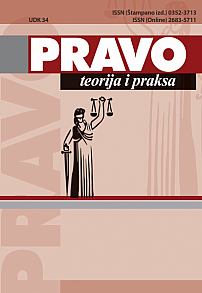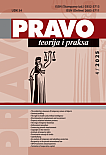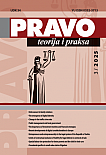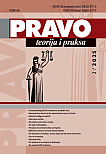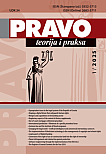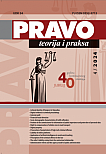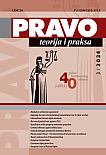Pravo - teorija i praksa
Since 2010, together with the publishing house "PRAVO" from Novi Sad, the Faculty of Law for Commerce and Judiciary of the University Business Academy in Novi Sad has been publishing the scientific journal "Pravo - teorija i praksa". The journal has already been published for thirty-seven years. During the period from 2011 to 2018, the journal was categorized as the M53 category of academic journals by the Ministry of Education and Science. In 2019, the journal was categorized as a prominent national journal (category M52). In 2020, the journal is recognized as a top journal of national importance (category M51) for the scientific field of Law and Political Science. In 2023, the journal is recognized as a national journal of international significance (Category: M24).
By nurturing the exchange of opinions and ideas, the journal aims at promoting positive solutions in the normative, judicial and administrative practice. The journal deals with issues from all areas of law. Its sections are continually enriched by new content: current issues, views and opinions, original articles, new regulations, extracts from foreign law, comments on new regulations, comment on the existing court practice, overviews of monographs from seminars and conferences and conference proceedings.
A large number of authors, research associates and renowned experts from all areas of law participate in the creation of the academic journal "Pravo - teorija i praksa".
Thanks to its highly relevant and quality content, the journal has gained an envious reputation both in our country and abroad and has become a useful and reliable reference book for everyday legal practice.
The academic journal "Pravo - teorija i praksa" is intended for all jurists and judicial bodies, institutions, businesses, private companies and entrepreneurs, as well as all legal entities who wish to stay informed and get introduced to new regulations, as well as court and legal practice. The journal is supposed to promote lawful, efficient and successful procedures in everyday legal practice.
The journal is issued in the form of four issues per volume, every three months, and the subscription is 25,000.00 dinars (250 euros for authors from abroad) per manuscript (we are exempt from payment of V.A.T.).
- Pravo - Teorija i Praksa
- Право – Теорија и Пракса
- Law – Theory and Practice
Редакција "Право – Теорија и Пракса"
Выпуски журнала
Статьи журнала
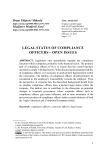
Legal status of compliance officers – open issues
Статья научная
Legislators only sporadically regulate the compliance function within companies, primarily in the financial sector. The primary task of compliance officers (CO) is to ensure that the overall business operations comply with legal norms. When discussing the potential liability of compliance officers, it is necessary to analyze their legal position within the corporation. The liability of compliance officers should primarily be considered as the employee’s responsibility towards the employer. From the perspective of corporate law, the theoretical background should focus on whether compliance officers have a distinct legal status within the company. The authors aim to contribute to the discussion on potential changes in corporate governance, where corporate officers such as compliance officers gain more influence, and to raise awareness of the precarious position of compliance officers under current solutions of both the Anglo-American and Continental European models.
Бесплатно
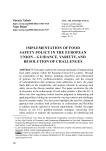
Статья научная
The paper explores the intricate landscape of implementing food safety policies within the European Union (EU) context. Through an examination of key themes, including discretion and enforcement of policies, the EU’s problem-resolution strategies, and the concept of individualization that surpasses mere adherence to laws, the paper sheds light on the complexities and nuances inherent in ensuring food safety across the diverse member states. The paper scrutinizes the role of discretion in the enforcement of food safety policies within the EU. It delves into how regulatory bodies exercise judgment in interpreting and applying policies, taking into account the varying contexts and challenges faced by member states. The discussion highlights the need for a balanced approach that considers both uniformity in enforcement and flexibility to address specific regional or sectoral requirements. Further, the paper focuses on the EU’s problem-resolution strategies concerning food safety policies. It explores the mechanisms in place for identifying and addressing challenges that arise during the implementation phase. This includes an analysis of coordination among member states, collaboration with stakeholders, and the role of regulatory bodies in mitigating issues and fostering a harmonized approach to problem-solving. In the end, the paper introduces the concept of individualization, emphasizing how a diverse range of policies and practices exists beyond mere adherence to overarching laws. This section explores the unique approaches taken by member states in tailoring food safety policies to suit their specific circumstances. It investigates the benefits and potential challenges associated with such individualization, considering its impact on overall policy effectiveness and coherence.
Бесплатно
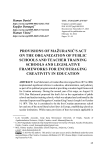
Статья научная
Ivan Mažuranić, Croatian Ban who reigned from 1873-1880 implemented significant reforms in education, administration, and judiciary since his political programme focused on the provision of the modern legal framework for Croatian autonomy. During the second year of his reign, on 19th August 1874, Ban Mažuranić proposed to the Parliament a draft Act on the organisation of public schools and teacher training schools (original in Croatian Zakon ob ustroju pučkih školah i preparandijah), which was adopted and confirmed by the Austrian Emperor and Hungarian-Croatian King Francis Joseph I already on 14th October 1874. That Act is considered to be the first Croatian autonomous school law and one of the most liberal school laws in Europe, as it secured the schools the status of secular institutions. Many of the provisions of that Act are still accurate and applicable in today's Croatian educational system. However, being proposed back then, they caused serious debates and protests of all social classes. A qualitative comparative analysis of the Act on the organisation organization of public schools and teacher training schools and the current Act on education in primary and secondary schools will compare the legislative frameworks for encouraging creativity in education, which provide prerequisites for the creative and autonomous work of teachers. Having passed this law, Ban Mažuranić proved himself to be serious in fulfilling his election promises. Along with other laws enforced in judiciary and administration, this Act opened the way for the modernisation of the former Croatian state and its faster adoption of European standards of a modern civil state.
Бесплатно
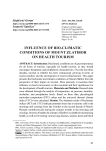
Influence of bio-climatic conditions of mount Zlatibor on health tourism
Статья научная
Introduction: Bioclimatic conditions are of great importance for all forms of tourism, especially for health tourism, as they should encompass therapeutic and prophylactic characteristics. Over the last three decades, tourism in Zlatibor has been continuously growing in terms of tourist numbers and the development of tourist infrastructure. This paper presents the bioclimatic and climatic conditions on Mount Zlatibor from the perspective of their impact on tourism. More precisely, it examines their influence on tourist movements on this mountain and their significance for the development of health tourism. Materials and Methods: Research data were obtained through the analysis of temperature, air pressure, humidity, insolation, and precipitation levels. Based on these data, physiological equivalent temperature (PET) values and the universal thermal climate index (UTCI) were calculated. Results: The obtained results of bioclimatic indices (PET and UTCI) indicate potential stress due to extreme cold in the mornings and evenings from late October to the second decade of March. Pleasant warmth prevails during the summer months in the mornings and evenings. In terms of health, the climate of Zlatibor is suitable for maintaining health, as well as for treating various lung diseases, anemia, heart and blood vessel disorders, especially thyroid disorders. Bioclimatic conditions closely correlate with tourist movements on Zlatibor, as evidenced by climate data and the results obtained from PET and UTCI calculations. Conclusion: Comparing tourist numbers over a five-year period reveals that bioclimatic conditions significantly influence Zlatibor’s peak tourist season, which occurs during the summer months. This period offers the most favorable bioclimatic conditions, attracting the highest number of visitors to the mountain, especially those seeking health and recreational activities.
Бесплатно
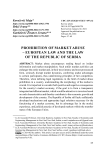
Prohibition of market abuse – European law and the law of the Republic of Serbia
Статья научная
Market abuse encompasses trading based on insider information and market manipulation. Such unfair market activities can endanger the entire market and, in their most intense and most pronounced form, seriously disrupt market dynamics, conferring undue advantages to certain participants, thus undermining principles of fair competition. Therefore, when defining legal regulations in the field of market abuse prohibition in a country, understanding the morphology of the market is crucial. It is important to consider both positive and negative consequences for the country’s market economy, if the goal is to form a transparent, integrated and efficient market, which would be attractive to investors based on such characteristics and thereby contribute to the economic growth and development of the country. The Republic of Serbia still lacks sufficiently developed mechanisms and appropriate legal solutions necessary for the functioning of a market economy, but its advantage lies in the model, experience, and judicial practice of developed markets within the member states of the European Union.
Бесплатно
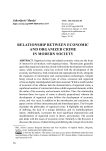
Relationship between economic and organized crime in modern society
Статья научная
Organized crime and related economic crime are the focus of interest for all modern, well-organized states. Theoreticians generally agree that organized crime has closely followed the development of modern states, while economic crime has evolved with the development of the economy and business, both at national and supranational levels, alongside the expansion of information and communication technologies. Despite being viewed as two distinct types of crime, economic and organized crime are highly interdependent and interconnected. While a small number of economic crime offenses lack the characteristics of organized crime, a significant number of criminal activities exhibit organized elements within the realm of the economy and economic activities. Thus, the relationship between these two types of crime is directly proportional, wherein the development of organized crime follows the development of economic crime, and vice versa. In addition to the introduction and conclusion, the paper consists of three interconnected and interrelated parts. The first part elucidates the philosophy of organized crime. It highlights the problems of defining, the lack of a unique definition, and its multidisciplinary nature. Additionally, it presents the most significant characteristics and manifestations of organized crime in theory and practice. The second part deals with the issues of economic crime. Similarly to the first part, it discusses the process of determining and defining the concept of economic crime, presenting its basic characteristics and contemporary types. Finally, the third part of the paper examines the relationship between these two categories of crime.
Бесплатно

